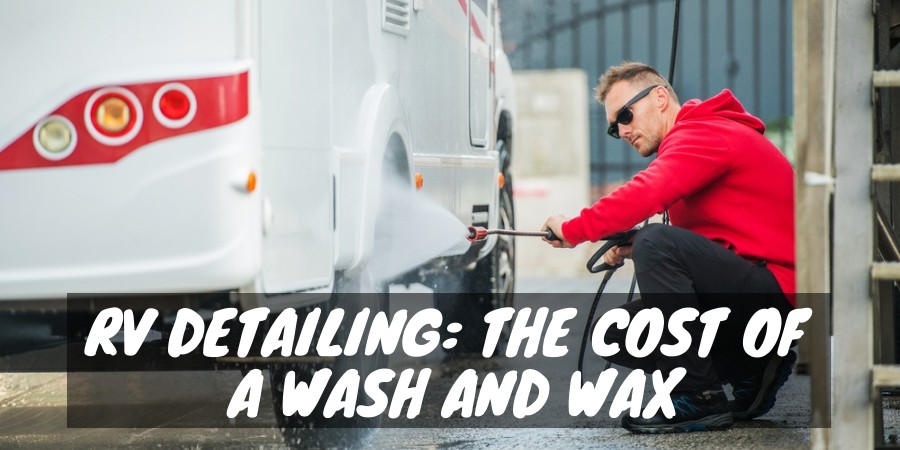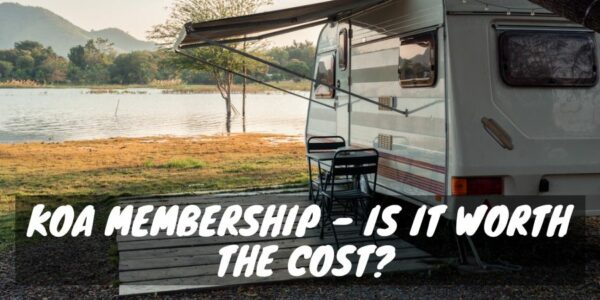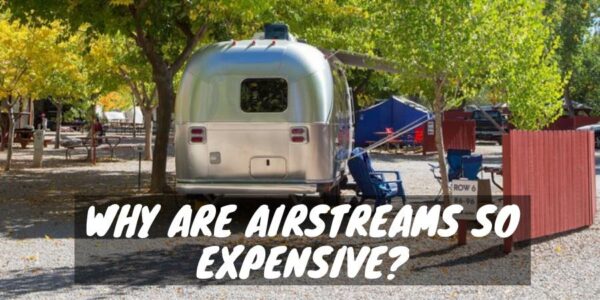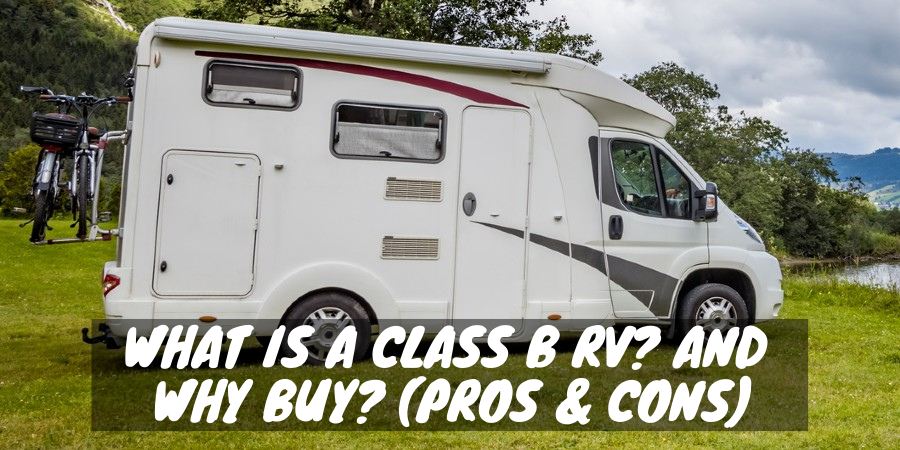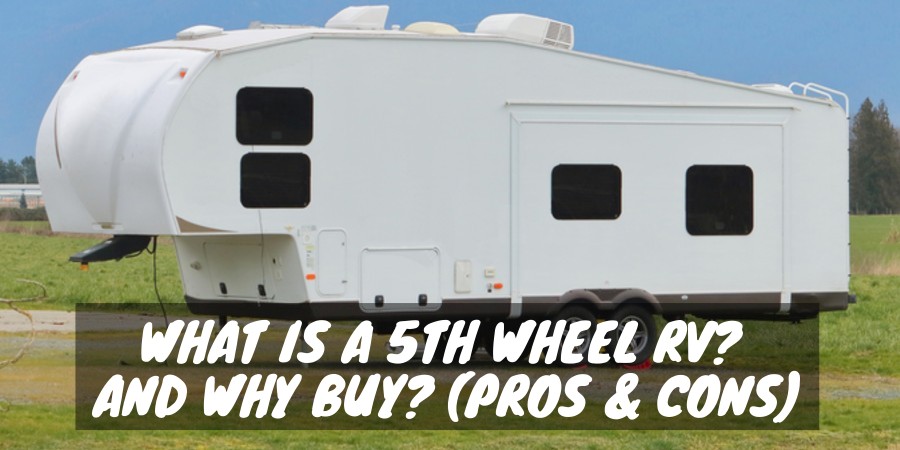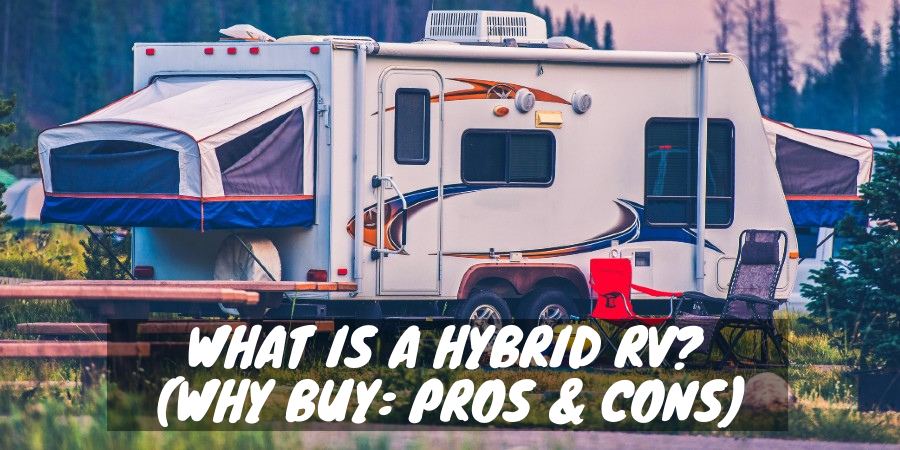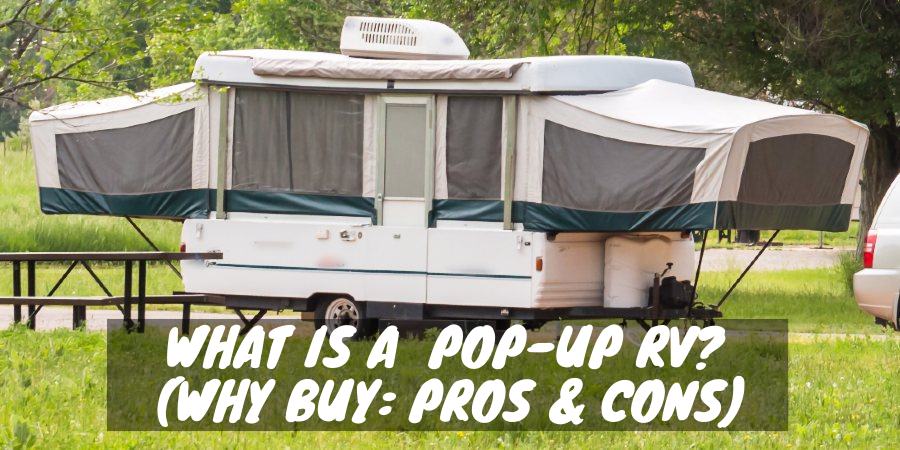We all want a shiny, dirt-free RV, but road travel makes keeping it that way impossible. Professional RV washing services seem expensive, but washing the camper yourself takes a lot of time and special equipment to get it right.
So, which option is better, and should you wax your camper every year?
To help you decide, I break down the costs and results between DIY vs. professional RV washing and waxing here in this guide.
There’s pros and cons to both RV cleaning options, so let’s sort out the different choices to keep your camper looking sharp!
How Dirt and Grime Ruin Your RV Exterior
RVs are large, so they capture a lot of dirt and dust when you travel, along with picking up:
- Bird droppings
- Road salts or chemicals
- Tree sap
- Tar
- Bugs
Add all that in with continual UV exposure, temperature extremes, and even acid rain and your camper’s exterior can look worn fast.
Any aluminum, fiberglass, sheet metal, and rubber surfaces on the RV siding and roof will get dull from debris wearing away the protective surface coatings.
Letting dirt and grime sit on the RV too long will cause corrosion, staining, rust, and spotting of the surface that you may not be able to remove.
Decals on the RV incur damage even quicker. Peeling, fading, and cracking are common and will make your entire camper look older and less attractive if you don’t keep them clean and protected from the elements.
How Often Should You Wash an RV?
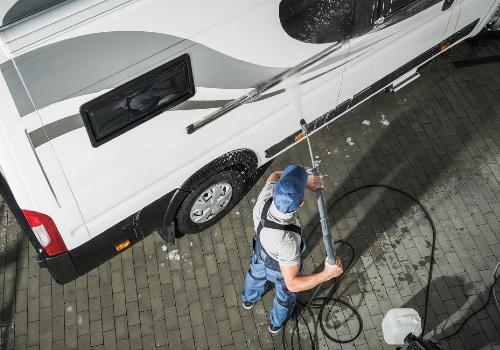
Washing your RV needs to happen when you see it’s dirty.
Cleaning your RV helps you spot areas of damage, so you can repair them right away and keeps your camper’s exterior and awning in good condition.
Don’t listen to people who say only wash your RV once a month or once a quarter.
That schedule may work fine if you only camp a few times a year, but for full-timers or those who camp more often, you’ll need to pick up the washing schedule.
You can opt to go with a good waxing 1-2 times a year, but washing is critical once you see an accumulation of road grime and bugs on your RV.
As a full-timer, I wash at least a portion of my camper every two weeks, sometimes more, using a mix of DIY and professional services. This washing is vital during love bug season in the south, as those little buggers will coat your entire front end during even a short journey between campgrounds.
If the entire motorhome isn’t looking bad, I’ll concentrate on the front end where dead bugs splatter and hit any black streaks on the siding that form when rain or dew run off the dirty roof.
When it needs a deep clean and shine, I go professional, and I explain why in that section down below.
Keeping up with washing and waxing is part of the RV maintenance routine. You must not ignore it if you want to keep the exterior looking good, protect your investment, and avoid campgrounds turning you away for having an “unkempt” camper.
Yes, I know what you’re thinking. Who has time for all this washing?
Our busy lives create a time crunch, which explains why so many RV owners put off washing and waxing their motorhome or travel trailer, and why so many campers end up with permanent damage to the exterior.
To help prevent damage, you need to either step up and DIY wash and wax your RV or call in the professionals when your camper is dirty, so let’s break down the pros and cons of each option.
Complete Cost to Wash and Wax an RV Yourself
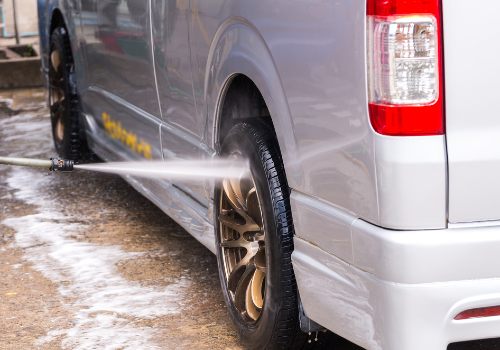
For a proper RV wash and wax, you’ll need a tote of supplies, plus a ladder, hose, and high-pressure sprayer.
Expect to pay about this amount for supplies:
| SUPPLIES | COST |
| Pre-wash cleanser | $12 |
| RV Wash | $30 |
| Wax | $25 |
| Window cleaner | $10 |
| Brushes | $35 (with extension pole) |
| Buffer sponges | $30 (various sizes) |
| Microfiber cloths | $20 |
| Tire Treatment | $18 |
Keep in mind that you’ll need to buy more cleaners, wax, and equipment as you use them up or wear them out. One large RV can use up full containers on each wash.
If you full-time, you’ll also need to carry all these supplies with you and take up valuable storage space.
Washing and waxing even small recreational vehicles will take hours, so keep that in mind before starting the project.
You’ll also want to avoid washing your RV during the hottest part of the day. A shady location is best, as the heat and sun can dry up cleaning solutions and wax, leaving behind a streaky finish or residue that will harden on the exterior’s finish coat.
Often the results aren’t what you expect, and you may leave your camper’s exterior looking dull or scratching up the decals.
Pros and Cons of DIY RV Washing and Waxing
Before taking on washing and waxing your RV, consider these pros and cons:
PROS:
- Can wash the RV on your own schedule
- Affordable
- You can select the cleaning products
- You know all the “delicate” areas of your RV that require extra care
CONS:
- Weather/sun conditions must be right to avoid poor results
- Large time commitment
- Need to store RV cleaners and supplies
- Must climb ladders and on the roof to reach all the dirt
- Many HOA’s and campgrounds forbid RV washing onsite
- Improper use of a power washer damages decals, panels, and forces water into RV cracks
Cost for a Professional RV Wash and Wax
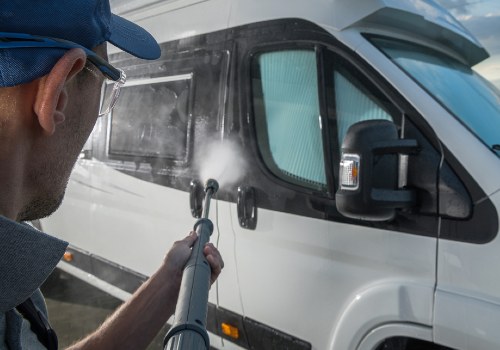
There are two types of professional RV wash services. One is a stationary business where you deliver your RV for cleaning, then pick up when done. The other is a mobile service that brings all the supplies to your home or campsite (if allowed).
Both types of RV wash and wax services charge by the linear foot of your camper and then add on different charges for specific extras you may want or need.
A basic wash averages $2-$6 a linear foot, but many services have a base rate no matter how small your RV.
A wash and wax combination average $15-$25 per linear foot.
Expect to pay a separate convenience fee for mobile service or a higher per-foot rate to offset the cost of bringing all the equipment to your location.
Some RV detailing companies also offer interior cleaning, which can add another $50-$100 to your total bill.
Getting an exact quote for your RV wash and wax won’t happen until a visual inspection of your camper occurs. The experts must determine the level of dirtiness and factor in any special cleaning techniques and cleaners necessary to get the job done right.
Here’s an average total cost of a wash and wax for various RV lengths:
| RV LENGTH | COST |
| 20-foot and under | $100-$175 |
| 20-25 feet | $150-$200 |
| 26-30 feet | $170-$300 |
| 30-40 feet | $300-$500 |
| 40+ feet | $400-$700 |
These prices may seem high, but the work involved in getting an RV fully clean with a layer of durable wax protection is extensive.
Why Professional RV Washing and Waxing Is Better
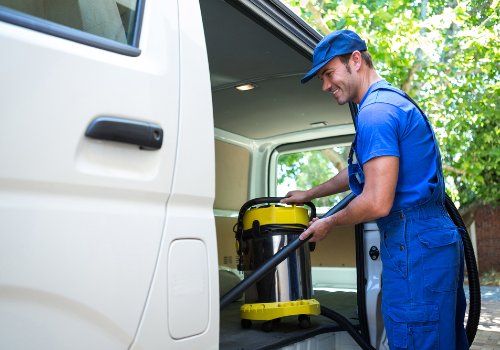
Having a professional wash and wax your RV may seem like an unnecessary luxury expense. Still, it’s often the best solution to keep your camper in top condition.
To keep your RV looking new, taking it to a company that knows the correct cleansers, waxes, and protectants for different RV exterior surfaces is the only way to go.
RV detailing companies will have an arsenal of tools and supplies to cover every type of surface and dirt combination, which is cost-prohibitive for most DIYers.
It’s also important to note that RV resale value is higher for campers that retain their glossy sheen and intact decals, and expert cleaning can avoid scratches or damage a DIY wash and wax may incur.
Here’s the pros and cons of professional RV washing and waxing:
PROS:
- Saves time and stress
- Avoids personal injury from slips or falls during DIY cleaning
- They provide all the correct cleaning products and equipment
- They expertly use a pressure washer to avoid damage
- They use a crew to wax and buff the RV to achieve a streak-free finish
- Mobile service avoids having to deliver the RV for washing
- They often provide options for renewing protective seal coats on RV siding and roofs
- Reputable companies will have insurance and warrant their work
CONS:
- Expensive
- Need to drop off RV for service which may interfere with your camping schedule
- You must do research to find a reputable service
From years of experience, I can attest that getting your RV wash and wax from a professional looks way better than a DIY job, and the results last longer.
If you can afford it, taking your recreational vehicle to an RV detailing expert is worth every penny. I know many owners who make stops at their favorite RV wash a part of their travel itinerary.
For those with large motorcoaches or fifth-wheels, professional cleaning is nearly always the best move. The sheer area that needs washing and waxing can take a full day or two for a single or couple to tackle themselves.
For RVers on a budget, like me, you’ll find that alternating a few DIY washes with a professional wash and wax is the best solution to keeping your RVs exterior in great shape.
Taking Your RV to a Commercial Carwash Bay

Are you thinking of taking your RV to a coin-operated carwash bay?
Most self-serve commercial carwash centers have one or two large and tall bays for boats and RVs.
Want to Connect With a Community of Over 1,078 RV Enthusiasts?
My experience using them is mixed. There isn’t enough room between the camper and the walls to maneuver around the RV to get a good wash in, and the water flow for rinsing takes a long time.
For a quick clean to remove dust and bugs, these bays are a good alternative.
RV Wash and Wax FAQs
Can You Use A Pressure Washer On Your RV?
You can use a pressure washer on RVs with extreme care, but most people should avoid using this tool.
Once you blast off paint or decals, you’ll be looking at costly repairs.
A pressure washer can also force dents into your siding and pull up roofing materials or caulking if you’re not careful.
Airstream guides owners to never use a pressure washer set higher than 2500 PSI and never bring the nozzle closer than 30″ to the surface, or damage may result.
What Products Are Best to Wash and Wax Your RV?
Recommended products that work:
Thetford RV Bug Bust is affordable and an easy way to hit your RV’s front end for quick clean-ups before or between washings.
A washing cleanser that also contains wax, like Star Brite RV Wash & Wax, is an efficient way to clean and protect any type of RV surface.
Meguiar’s Ultimate Liquid Wax is a favorite for RVs owners with fiberglass exteriors that have a gel coat.
Vinyl exteriors do well with an inexpensive 30% vinegar to 70% water wash. You can add a touch of Dawn dish soap if necessary.
DIYers appreciate the ease of using a random orbital buffer, like the Black & Decker WP900, when waxing to create a smooth, shiny, streak-free surface on flat RV siding.
RVs like Airstreams with aluminum cladding do best with Walbernize RV Super Seal, which is a wax coating safe for aluminum and all fiberglass, acrylic, and urethane RV panels with a glaze coating finish.
How Do You Clean Black Streaks Off My RV?
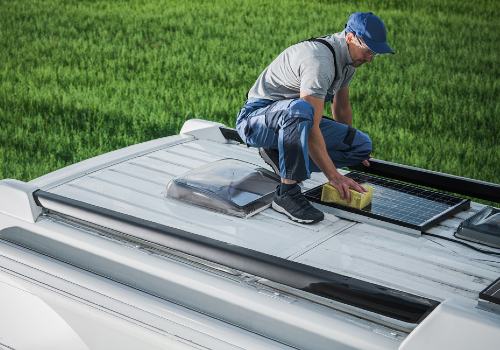
Black streaks are a constant nuisance that forms on RV siding as dirt and water run off the camper’s roof. Keeping these streaks from setting in stains means you need to wipe them away immediately after they form.
You can purchase many products specifically for black streak removal, and all work equally well, but I’ve found they work best when you apply the product with a magic eraser-type sponge.
Do be gentle when using the sponge, as it’s abrasive and can cause fine scratches if you push too hard.
Will Simple Green remove black streaks from camper siding?
Yes, Simple Green works wonders to clean off streaks and remove mildew on awning material and is ecologically safe to use as an all-around RV cleaner.
Can You Wax Your RV Decals?
Yes, you can and should wax your RV decals to keep them from cracking a peeling.
You must be careful only to use a wax product that states it won’t stain or discolor surfaces. Many generic waxes use colorants or chemicals that can damage your decals, so read labels carefully.
Final Thoughts
The key to a long-lasting finish on your RV’s exterior is to keep it clean and the clear coat strong.
Using a professional RV wash and wax service is the best way to achieve a quality finish and is worth the expense.
But, with practice, time, and the right tools and equipment, you can achieve excellent DIY results as well.
Whichever method you choose, making sure your RV stays clean and shiny should be a top priority!
Professional RV Wash, Wax and Detail Tips (Video)
"Man cannot discover new oceans unless he has the courage to lose sight of the shore."
-- Andre Gide

